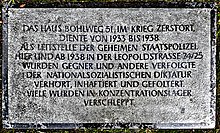Eduard Holste
Eduard Holste (born February 14, 1904 in Braunschweig , † January 16, 1969 in Marburg ) was a German lawyer , NSDAP member, SA and SS member (most recently in the rank of SS Obersturmbannführer ), from 1936 to 1940 head of the Secret State Police (Gestapo) in Braunschweig, during the Second World War as a member of the Einsatzgruppen of the Security Police and the SD on the Eastern Front .
Life
Holste was born the son of a butcher . From 1931 to 1935 he worked as a court assessor . For a few months he was a member of the German People's Party (DVP), later of the German National People's Party (DNVP). Holste had been a member of the NSDAP since May 1, 1933 and a member of the SS since August 2, 1933. On July 14, 1935, he resigned from the Reich Service and joined the Braunschweig Political Police .
Gestapo leader in Braunschweig

In the mid-1930s, the later Higher SS and Police Leader and after the end of the war in Riga convicted and executed war criminal Friedrich Jeckeln was head of the Secret State Police in Braunschweig. Jeckeln held the office until 1936.
After Holste joined the Braunschweig Police Service, he was soon appointed by the Braunschweig Ministry of the Interior under the direction of Dietrich Klagges as Jeckeln's second deputy next to Otto Diederich . Jeckeln left Braunschweig in 1936, whereupon Holste became his successor. In an official assessment of January 14, 1936, Jeckeln u. a. that Holste's decisions were characterized by the fact that they were always made in the National Socialist sense and show that he was permeated by the ideas of National Socialism .
Holste headed the Braunschweig Gestapo, which was located at Bohlweg 51 until 1940; his deputy was Willy Lages . His successor in office was Horst Freytag (July 24, 1940 to October 31, 1942), followed by the last head of the office, Günther Kuhl (January 1, 1943 to April 10, 1945, → handover of the city of Braunschweig ).
In 1936 Holste had the rank of SS-Untersturmführer as leader in the security service of the Reichsführer SS (SD), whose leader was Reinhard Heydrich . During his tenure in Braunschweig, Holste was promoted to the government council on October 25, 1937 and in 1938 to SS-Sturmbannführer as leader in the SD main office .
War participant
After the German attack on Poland on September 1, 1939 and the associated start of the Second World War, Holste was initially deployed from September to October as a liaison officer of the Security Police (Sipo) to AOK 10 . From September 29, 1941 to September 30, 1942 Holste was deployed in the Einsatzgruppen of the Security Police and the SD in the area of Army Group Center in Russia, and from March 6, 1943 in the area of Army Group South . Holste initially headed Divisions IV (Gestapo) and V (Criminal Police) in Task Force B , and later the Task Force " Smolensk ". On September 30, 1944, he was promoted to SS-Obersturmbannführer. At the beginning of 1945 a proposal followed for promotion to the Upper Government Council .
post war period
After the end of the war, which Holste is said to have experienced as a member of an SS mountain infantry regiment , he was initially considered missing , but from 1954 he lived in Bad Harzburg , where his wife had lived since 1942. In 1956 the couple moved to Hagen . Holste lived in Marburg from 1965 until his death.
Between 1961 and 1965 Holste was accused in various Nazi trials against members of the Einsatzgruppen.
literature
- Bernhild Vögel: Holste, Eduard. Horst-Rüdiger Jarck , Günter Scheel (Ed.): Braunschweigisches Biographisches Lexikon - 19th and 20th centuries . Hahnsche Buchhandlung, Hannover 1996, ISBN 3-7752-5838-8 , p. 285 .
- Gerhard Wysocki: The Secret State Police in Braunschweig. Police law and police practice under National Socialism. Campus Verlag, Frankfurt / New York, 1997, ISBN 3-593-35835-2 .
Individual evidence
- ↑ a b c Bernhild Vögel: Holste, Eduard. In: Jarck, Scheel: Braunschweigisches Biographisches Lexikon. P. 285.
- ^ Gerhard Wysocki: The Secret State Police in the state of Braunschweig. Police law and police practice under National Socialism. P. 73, FN 134.
- ^ Bernhard Kiekenap : Hitler's and Himmler's executioners. The SS general from Braunschweig. Biographical notes on Friedrich Jeckeln (1895–1946). Appelhans Verlag, Braunschweig 2013, ISBN 978-3-941737-91-4 .
- ^ Irmtrud Wojak : Fritz Bauer 1903–1968. A biography. CH Beck, Munich 2009, ISBN 978-3-406-58154-0 , p. 247.
- ^ A b c d Gerhard Wysocki: The Secret State Police in the state of Braunschweig. Police law and police practice under National Socialism. P. 74, FN 134.
- ↑ Braunschweigisches address book for the year 1936. 122nd edition, printing and publishing house Joh. Heinr. Meyer, Braunschweig 1936.
- ^ Gerhard Wysocki: The Secret State Police in the state of Braunschweig. Police law and police practice under National Socialism. P. 95 ( organizational chart ).
| personal data | |
|---|---|
| SURNAME | Holste, Eduard |
| BRIEF DESCRIPTION | German lawyer, Einsatzgruppen, SD and SS member |
| DATE OF BIRTH | February 14, 1904 |
| PLACE OF BIRTH | Braunschweig |
| DATE OF DEATH | 16th January 1969 |
| Place of death | Marburg |